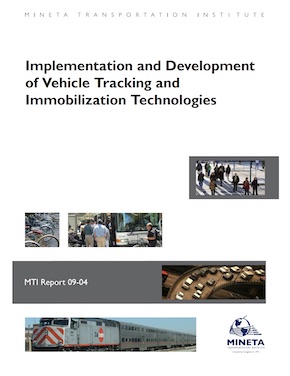- 408-924-7560
- mineta-institute@sjsu.edu
- Donate
Implementation and Development of Vehicle Tracking and Immobilization Technologies
Since the mid-1980s, limited use has been made of vehicle tracking using satellite communications to mitigate the security and safety risks created by the highway transportation of certain types of hazardous materials. However, vehicle-tracking technology applied to safety and security is increasingly being researched and piloted, and it has been the subject of several government reports and legislative mandates.
At the same time, the motor carrier industry has been investing in and implementing vehicle tracking, for a number of reasons, particularly the increase in efficiency achieved through better management of both personnel (drivers) and assets (trucks or, as they are known, tractors; cargo loads; and trailers).
While vehicle tracking and immobilization technologies can play a significant role in preventing truck-borne hazardous materials from being used as weapons against key targets, they are not a “silver bullet.” However, the experience of DTTS and the FMCSA and TSA pilot projects indicates that when these technologies are combined with other security measures, and when the information they provide is used in conjunction with information supplied outside of the tracking system, they can provide defensive value to any effort to protect assets from attacks using hazmat as a weapon.
This report is a sister publication to MTI Report 09-03, Potential Terrorist Uses of Highway-Borne Hazardous Materials. That publication was created in response to the Department of Homeland Security’s request that the Mineta Transportation Institute’s National Transportation Security Center of Excellence provide research and insights regarding the security risks created by the highway transportation of hazardous materials.
BRIAN MICHAEL JENKINS
Brian Michael Jenkins is the director of the National Transportation Security Center of Excellence (NTSCOE) and one of the world’s leading authorities on terrorism and sophisticated crime. He works with government agencies, international organizations, and multinational corporations as an analyst, investigator, and crisis-management consultant. From 1989 to 1998, Mr. Jenkins was the Deputy Chairman of Kroll Associates, an international investigative and consulting firm. Before that, he was chairman of the RAND Political Science Department, where, from 1972 to 1989, he also directed RAND research on political violence.
Mr. Jenkins obtained his bachelor of arts degree in fine arts and his master of arts degree in history from the University of California, Los Angeles. He has also studied at the University of Guanajuato in Mexico and the University of San Carlos in Guatemala, where he was a Fulbright Fellow and the recipient of a second fellowship from the Organization of American States.
BRUCE ROBERT BUTTERWORTH
Bruce Butterworth has had a distinguished government career, working at congressional, senior policy, and operational levels. Between 1975 and 1980, as a professional staff member of the House Government Operations Committee, he ran investigations and hearings on many transportation safety issues, particularly in aviation. He spent 11 years in the Department of Transportation, eight of them in the Office of the Secretary. He managed negotiations on the inclusion of air and maritime services in the GATT (now WTO), chaired U.S. delegations to United Nations Committees, dealt with transport and aviation issues related to border inspections, and was part of the response to the bombing of Pan Am 103.
Mr. Butterworth was awarded a master of science degree from the London School of Economics in 1974 and a bachelor of arts degree from the University of the Pacific in 1972 (magna cum laude). He was a California State Scholar and a Rotary Foundation Fellow. He also received numerous special achievement and performance awards.
FRANCES L. EDWARDS, M.U.P., PH.D., CEM
Frances L. Edwards, Ph.D., CEM, is the director of the Master of Public Administration program and professor of Political Science at San José State University. She is also an MTI research associate and teaches emergency management in the Master of Transportation Management program. In 2009 she was appointed United States chair for the European Union CAST Project for the development of unified training for first responders. Her most recent research has been in global supply chain security, resulting in a chapter co-authored with Dan Goodrich, “Supply Chain Security and the Need for Continuous Assessment,” to be published in Supply Chain Security: International Innovations and Practices for Moving Goods Safely and Efficiently by Praeger. In 2009 she delivered papers at the Department of Homeland Security Center of Excellence conference on MTI’s research agenda, and at the American Society for Public Administration on “Legacy of Hurricane Katrina: The Challenges of International Goodwill.” In 2008 she delivered papers at the American Society for Public Administration on the financial impacts of Hurricane Katrina, and at the Stevenson Disaster Institute at Louisiana State University on cross border issues in disaster response. Her paper was published in 2009 in the Journal of Contingency and Crisis Management. In June 2007 she was a guest of the Turkish government at the 2nd Istanbul Conference on Democracy and Global Security where she delivered a paper titled “Police in Catastrophic Response: Lessons Learned from Hurricane Katrina.” She also presented a paper at the American Society for Public Administration (ASPA) on “Collaborative Leadership in Dynamic Environments of Disasters and Crises: Collaboration at the Local Level;” and she received the Petak Award for the best paper in emergency management delivered at the 2006 conference.
-
Contact Us
San José State University One Washington Square, San Jose, CA 95192 Phone: 408-924-7560 Email: mineta-institute@sjsu.edu






